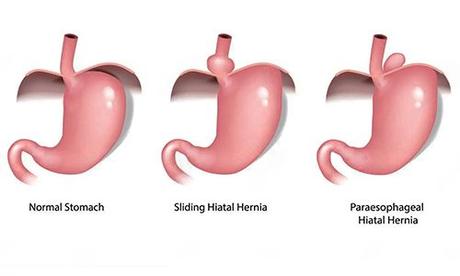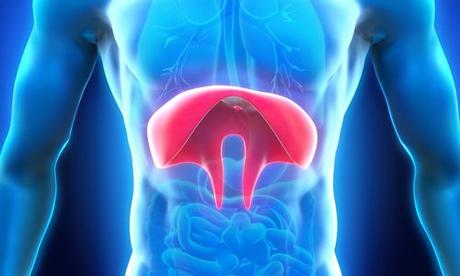Ever felt like there's a burning sensation in your chest after eating? It could be more than just indigestion-it might be a sign of a hiatal hernia. So, exactly what is Hiatal Hernia? The diaphragm, a muscle that separates the chest from the abdomen, has a small opening called the hiatus, through which the esophagus passes. In the case of a hiatal hernia, part of the stomach sneaks through this opening and enters into the chest cavity. But how exactly does this happen? Let's explore the causes.
What is a Hiatal hernia
A hiatal hernia is a condition where the stomach pushes through an opening in the diaphragm, causing symptoms like acid reflux, heartburn, and swallowing problems. Obesity, aging, or injuries can increase the risk of developing a hiatal hernia, and it can be treated with lifestyle adjustments or surgery.
Types of Hiatal Hernia

There are two main types of hiatal hernias, and they differ based on how much of the stomach pushes through the diaphragm:
1. Sliding Hiatal Hernia
This is the most common type. In this case, the stomach and the lower part of the esophagus slide up into the chest through the diaphragm. This type often causes symptoms like heartburn and acid reflux , as stomach acids easily move back up into the esophagus.
2. Paraesophageal Hiatal Hernia
Less common but more severe, this occurs when part of the stomach pushes up beside the esophagus, which may lead to more significant complications. Although it might not always cause symptoms, it can sometimes lead to the stomach becoming "strangled," cutting off the blood supply, which is a medical emergency.
So, why do these hernias happen? Let's dig deeper into the causes.
Causes of Hiatal Hernia

You might wonder, "Why does part of the stomach decide to move where it doesn't belong?" There isn't always a clear-cut reason, but several factors can contribute to the development of a hiatal hernia. One of the primary culprits is weakened muscles in the diaphragm. As we age, these muscles can lose some of their strength, making it easier for the stomach to protrude through the hiatus. Hiatal hernias are also more common in people over the age of 50.
Other contributing factors include:
- Increased pressure in the abdomen due to activities like heavy lifting, straining during bowel movements, persistent coughing, or pregnancy.
- Carrying extra weight adds pressure on the abdomen, increasing the risk of a hernia.
- Physical injuries to the diaphragm area can weaken the muscles, creating an opening for a hernia.
Now that we know why it happens, what are the signs that point to a hiatal hernia?
Hiatal Hernia Symptoms

So, how can you tell if what you're experiencing is related to a hiatal hernia? Many people with small hernias may not notice any symptoms at all. However, larger hiatal hernias can cause a range of uncomfortable symptoms, including:
- Heartburn after eating.
- Regurgitation - Acidic or sour-tasting food or liquid moving back into the mouth or throat.
- You might feel like food is getting stuck in your throat.
- Chest or abdominal pain. Some people mistake this for the discomfort of a heart attack.
- Bloating and belching - Feeling overly full or gassy after meals.
- Sometimes, the hernia can press against the lungs, making breathing difficult.
Think you might have a hiatal hernia? It's time to talk to your doctor. But how is it diagnosed? Let's move on to that next.
How is Hiatal Hernia Diagnosed?
If you suspect you have a hiatal hernia, the first step is consulting with a healthcare professional. Diagnosis typically involves a few key tests to confirm the presence of a hernia:
1. Barium Swallow (Upper GI series)
You'll drink a chalky liquid that coats the inside of your digestive tract. X-rays are then taken to show how the stomach is positioned and whether a hernia is present.
2. Endoscopy
A thin, flexible tube with a camera (endoscope) is passed down your throat to look inside your esophagus and stomach. This allows doctors to see the hernia directly and check for any irritation or damage to the esophagus.
3. Esophageal Manometry
This test measures the rhythmic muscle contractions in your esophagus when you swallow, helping detect any issues with pressure in the esophagus.
Once you've been diagnosed with a hiatal hernia, don't panic. We have several treatment options for managing it.
Hiatal Hernia Treatment

The good news is that many people with hiatal hernias don't require surgery. Lifestyle changes and medications can often help manage symptoms effectively. Here's a breakdown of common treatment approaches:
Medications
- Antacids: These can neutralize stomach acid and provide quick relief from heartburn.
- Proton pump inhibitors (PPIs): PPIs reduce the production of stomach acid, helping to prevent acid reflux and heal damage to the esophagus.
- H2 blockers: These medications also decrease acid production, though they work differently from PPIs.
However, if medications don't provide enough relief or if your hernia is severe, surgery might be considered.
When is Surgery Needed for a Hiatal Hernia?

In some cases, surgery may be required, particularly if you have a large paraesophageal hernia or if your symptoms are severe and unresponsive to other treatments. The most common surgical procedure for a hiatal hernia is called laparoscopic fundoplication. This minimally invasive surgery involves wrapping the upper part of the stomach around the lower esophagus to strengthen the barrier between the stomach and the esophagus.
Other surgical techniques may be used to reposition the stomach and tighten the hiatus opening. Surgery can be a long-term solution, but recovery times can vary.
How to Fix a Hiatal Hernia Yourself?

Looking for ways to manage symptoms at home by yourself? Don't worry there are several lifestyle changes and home remedies that can help ease the discomfort of a hiatal hernia:
- Large meals can increase abdominal pressure, worsening symptoms. So, try eating smaller, more frequent meals throughout the day.
- Avoid certain foods like spicy dishes, caffeine, alcohol, and citrus for digestive health. Because these foods can aggravate heartburn. So, it is important to experiment with cutting them out to see if symptoms improve.
- Lying down immediately after a meal can make acid reflux worse. Try staying upright for at least 2-3 hours after eating.
- Try to reduce excess weight to decrease pressure on the abdomen.
- Using extra pillows or elevating the head of your bed can reduce the likelihood of acid reflux during the night.
- Drinking chamomile or can help reduce inflammation and soothe the digestive tract.
- Tight clothes can put pressure on the abdomen and worsen symptoms. So, always wear loose and comfortable clothing.
Common FAQs About Hiatal Hernia
Hiatal hernias generally can be effectively managed with medications and lifestyle changes. Surgery is considered only in severe cases.
- What is the 3-fingertTest for Hernia?
The 3-finger test involves placing three fingers above the belly button and gently pressing inward while taking deep breaths. It's used to feel for any bulging or discomfort, potentially indicating a hernia.
- How Do I Check Myself for a Hiatal Hernia?
While self-diagnosis isn't recommended, symptoms like frequent heartburn, difficulty swallowing, or regurgitation could indicate a hiatal hernia. A proper diagnosis requires medical tests like an endoscopy or barium swallow.
Self-examination for a hernia isn't definitive. If you experience bulge or swelling in the abdomen, especially when coughing or straining, or symptoms of acid reflux that don't improve with remedies, it's time to consult a healthcare provider.
- Can constipation make Hiatal Hernia worse?
Yes, straining during bowel movements increases pressure in the abdomen, which can push more of the stomach through the diaphragm, worsening the hernia. You can manage constipation through a high-fiber diet, staying hydrated, and using gentle laxatives if necessary.
Final Thoughts
Hiatal hernias can be frustrating, but with the right combination of medical treatments and lifestyle changes, you can manage the symptoms and live comfortably. If you're dealing with persistent heartburn or suspect you might have a hiatal hernia, don't hesitate to seek medical advice. Your journey to feeling better starts with small, simple changes!

Leia is a fitness expert and a post-graduate in health and nutrition. She educates people through her articles based on research. Her works encourage readers to be aware of what makes food nutritious, the latest medical updates, weight loss, psychology, and a balanced diet. She believes in the well-known philosophy of all time, 'precaution is better than cure.' Explore Leia's other posts for more information and advice on a health-conscious active lifestyle.

